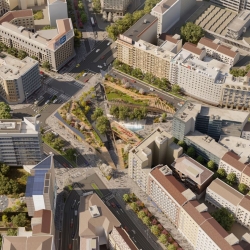
LOC – Loreto Open Community is the project that won the international call C40 Reinventing Cities for the urban regeneration of Piazzale Loreto in Milan with a team led by the company Nhood as investor and developer.
Nhood Services Italy S.p.A. is one of the main actors in the real estate industry in Italy specializing in urban redevelopment, as well as an important player in the commercial sector, which is part of AFM (Association Familiale Mulliez). Founded in 2021, it is a new company specialized in real estate consulting and services that develops new neighborhoods and mixed-use living places on…
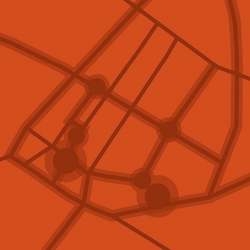
The project “Modena. Abitare dopo la pandemia: la città nel quartiere” (Modena. Dwelling after the pandemic: the city in the neighbourhood) focuses on social housing as the main lever to regenerate an area of the city where conditions of physical and social degradation persist, where housing discomfort is particularly acute, to build a model of widespread condominium, made up of housing, spaces and neighbourhood services, redeveloped and put in relation with each other to improve the liveability and urban quality of the city, without new land consumption.
The project proposal aims to regenerate a large urban area in the north…
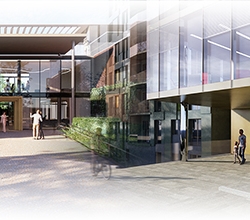
Regeneration, Sustainability and Inclusion. These are the essential points that summarize the lines of intervention of the public social housing project of the City of Parma MAS (Mosaic Housing Solidarity) admitted to funding within the framework of the ministerial competition PINQuA – Integrated Program for the Quality of Living, included in the PNRR. The project adopts a differentiated design, developed by the design company Policreo Srl and implemented through various public entities (Parma Infrastrutture Spa, A.S.P. Ad Personam and ACER Parma), in which urban regeneration and housing quality play a key role, as well as the conversion of buildings…
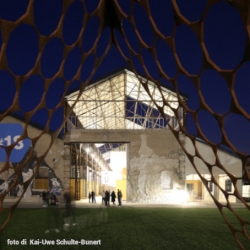
From the analysis of the context, the strengths and weaknesses of the city and its community, the objectives of the General Urban Plan (PUG) of Reggio Emilia have been defined in order to align with the 2030 agenda towards a greater quality and sustainability of life.
The plan has two goals: urban regeneration, conceived as the only opportunity to develop and innovate the city, definitively separating the duality of development and consumption that characterized the period of the building and demographic boom, and the care of the city and the community, through the requalification of existing facilities, to make them…
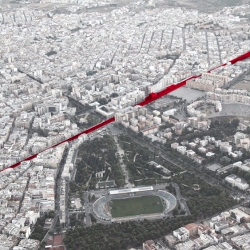
The three projects, located in the urban areas of the stations, aim at the quality of living in the city, reconnecting the two fronts determined by the trench, under construction, overlaying or under-crossing the railway in several points designed for viability, bicycle and pedestrian paths, squares, public spaces, green areas, requalifying central and peripheral areas, ensuring the provision of housing, intermodality, walkability, cycling.
ARIA-Sustainable housing, Urban redevelopment, Infrastructure, Green areas -Andria North
WATER-Sustainable housing, Unions, Urban Quality, Green Areas -Andria Central
EARTH-Sustainable building transformations, Rurality, Renaturalization, Green areas-Andria South
Common objectives:
- Increasing the availability of social housing with new subsidized housing, recovery of…
Francesca Abastante, Marta Bottero, Chiara D’Alpaos, Fabiana Forte, SIEV
In recent years, the European Union has launched a series of strategies to deal with climate change and environmental degradation. The most recent European Green Deal aims to make the European economy sustainable through a full transition to a green economy, investing in actions to stimulate resource efficiency, halt climate change, reduce pollution and biodiversity loss. The recent pandemic has further contributed to accelerate the transition towards economic models with better environmental and social sustainability and to catalyze the various processes already underway. This is the background to the recently…
Markus Hedorfer, Alessandro Calzavara, ASSURB – National Association of Town, Spatial and Environmental Planners
Within the actions of governance, the interest in environmental issues (and more specifically to aspects related to sustainability and resilience of settlements and territorial transformations) has increased significantly in recent decades. It has grown enough to incorporate specific evaluation processes, such as SEA, Vinca (Natura 2000 sites assessment, NIS in Ireland or HRA in the UK), AIA (authorisations mainly referred to IPPC), etc., that strongly influence / guide the authorisation process.
In the proposed session, the aim is to compare the different possible approaches to this…
Iginio Rossi, Francesco Sbetti, INU-URBIT
in collaboration with FIAB – ComuniCiclabili
Il “Patto per l’urbanistica città accessibili a tutti” (urban planning agreement for cities accessible for all) is the experimentation that INU is developing with the cities of: Ancona, Genoa, Livorno, Mantua, Reggio Emilia, Spello, Taranto and Udine, as part of the 2019-2022 “Accessible cities for all” program (www.atlantecittaccessibili.inu.it).
Through a shared work, the 8 cities intend to: define and apply integrated solutions to improve the quality of life; implement a system of welfare measures, dispositions and services; offer their community competitive advantages related to accessibility and sustainability in alignment with Agenda 2030;…
Andrea Arcidiacono, INU, Viviana di Martino, Silvia Ronchi, Politecnico di Milano
Soil is a limited and non-renewable resource, a fundamental element of the environment, the ecosystem and the landscape. It is essential for human wellness and for the performance of important ecosystem functions.
Waterproofing, erosion, loss of biodiversity, decrease of organic matter, salinization, contamination, compaction, soil consumption, landslides, desertification, pollution, are among the main threats that contribute to soil degradation and loss of this invaluable resource.
The latest report on soil consumption prepared by ISPRA and SNPA states that even in 2020 almost two square meters every second of agricultural and natural…




